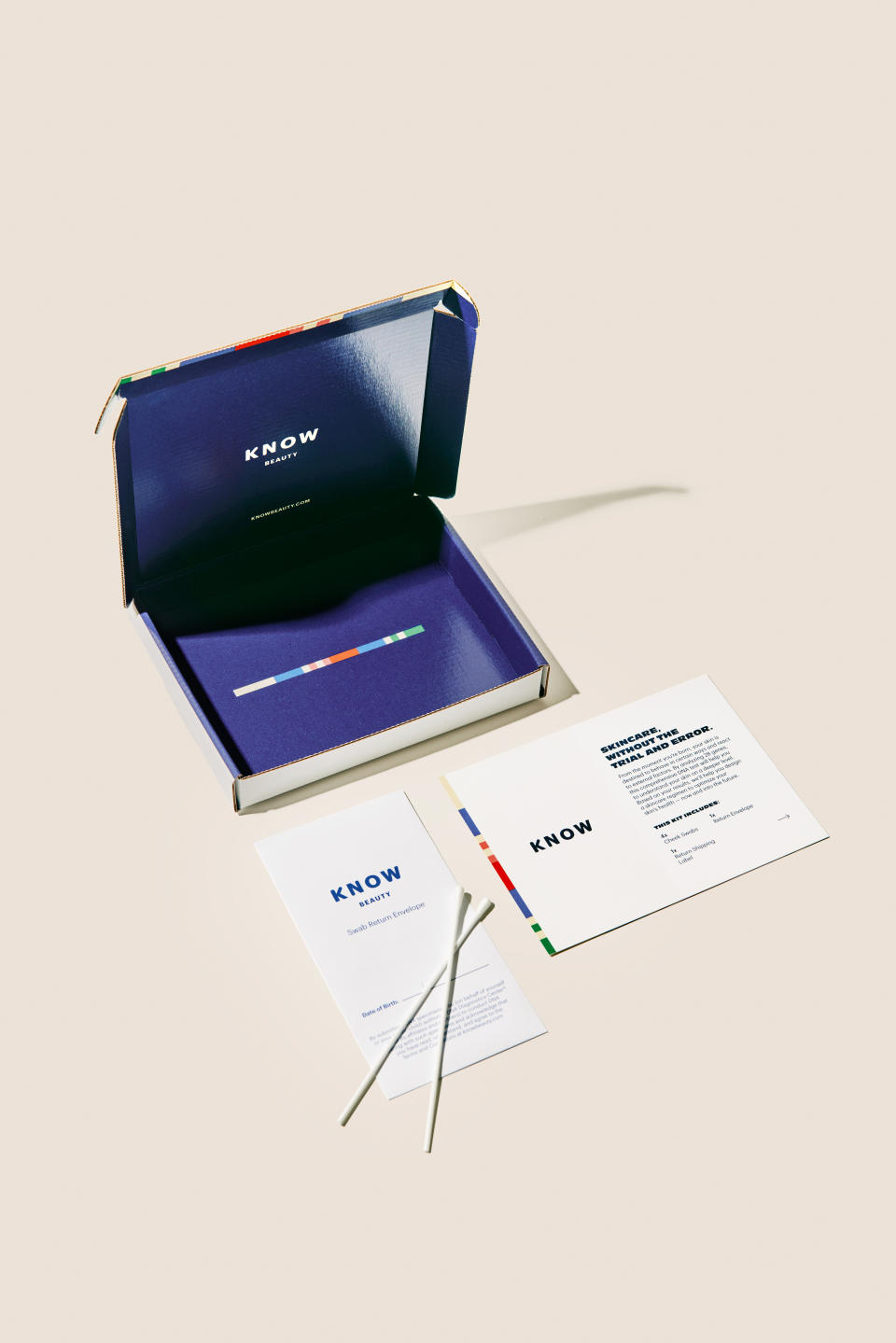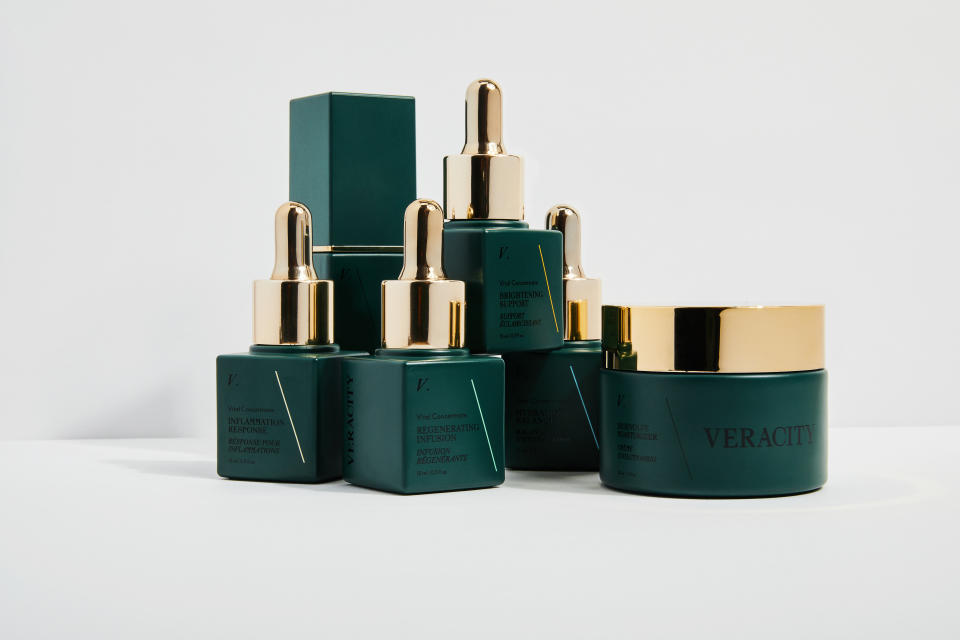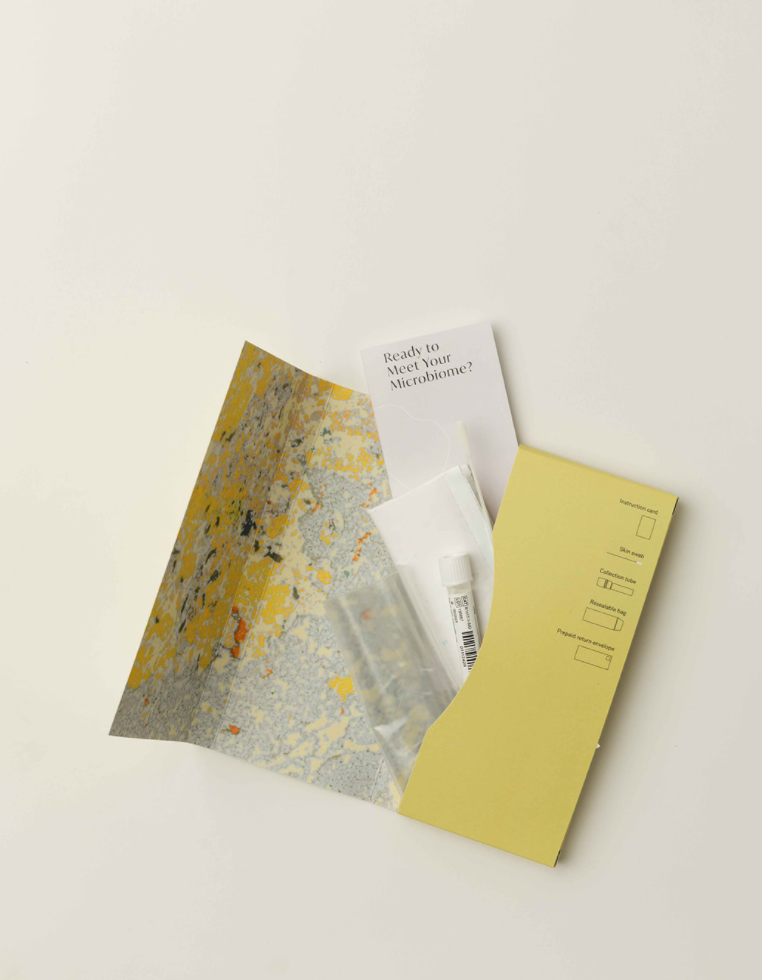Wellness Watch: How Genetic Testing Is Driving the Next Phase of Skin Care

Are consumers ready to hand over their DNA in the name of perfect skin?
While personalized beauty has usually come with an online diagnostic quiz, the customized beauty category is pivoting to more concrete science — and it often requires forking over information gleaned from your DNA. These days, companies are leaning into a swab of the mouth or even the forehead to find out more detailed information about consumers in order to prescribe personalized products and ingredients.
More from WWD
And what might seem overly invasive to older folks with concerns around privacy issues is being embraced by younger people interested in personalized beauty and more accustomed to sharing data.
About 76 percent of Gen Z and Millennial women are interested in taking a quiz to be given product recommendations that are more customized, according to an exclusive YPulse on-demand survey for WWD Beauty Inc that included 500 Gen Z and Millennial women.
According to YPulse’s research, 91 percent of Gen Z and Millennials are incredibly interested in products that are personalized to their needs. “A YPulse on-demand survey shows that 67 percent of young females say they are interested in skin care brands with swab tests for hormones, the microbiome and DNA to inform one’s skin care regimen, and 55 percent would be willing to share a biosample for DNA analysis for a more tailored product,” said MaryLeigh Bliss, vice president of content at YPulse. “But privacy will be a key element of participation for many.”
Jana Bobosikova, chief executive officer of Epic Brands, a Los Angeles-based brand operations agency, sees companies focus on front-end personalization – i.e., quizzes — as a customer acquisition and loyalty tool. But it’s in the area of diagnostic tests adapted or adopted from the medical ecosystem that have become a source of innovation to aid the positioning of their core products. “What we see coming is synthetic biology (or expressive biology, more poetically) and its ability to create truly personalized, de novo solutions designed and developed to address specific skin states,” she said.
From hormones to the skin microbiome and DNA, the at-home tests used by brands measure a range of biofactors and collect data to create long-term innovation. And no wonder. According to Euromonitor, there is a rising interest in DNA-based personalization, even though it’s still in the exploratory stages.
“There’s so much that determines your skin, including your genes and your microenvironment,” said Dr. Michelle Henry, New York City-based board-certified dermatologist. “The genes are really complex. And the presence of a gene doesn’t necessarily mean the expression of a gene. We are kind of in the Stone Age when it comes to using DNA and genetic information in this way.”
Know Beauty, which launched in June from founders Vanessa Hudgens and Madison Beer, saw an opportunity in DNA testing for consumers to better educate themselves on their skin. “Our focus is on delving into genetic personalization in skin so that we can open a door for prevention and maintenance,” said Dr. Avnee Shah, chief medical officer, Know Beauty. “Personalization can empower people to embrace a less cumbersome beauty routine by allowing you to have the actives that are best for your skin type. One possibility is that formulations will be compounded and created specifically for each individual consumer, allowing for varying degrees of actives based on exact skin needs.”

Know Beauty’s diagnostic, which has been taken by 50,000 users since launch, is a two-part process allowing the consumer to determine the future of their skin. For example, they may be at a higher risk of wrinkles or pigmentation due to genetic makeup. The customer receives the Skin DNA Kit, $95, (which focuses on genotype) that includes a cotton swab for administering a cheek swab. Once sent back to the brand, the sample is analyzed. While the test is at the lab, the customer takes an online quiz (focusing on phenotype), which homes in on the current skin concerns in combination with other factors, like weather, stress, hydration and diet, so it takes into account skin condition, priorities and lifestyle. Within 10 to 14 days, results are sent with recommended skin care products from the Know Beauty assortment, $18 to $22, based on genotype/phenotype combination. “You only need to take the DNA test once in your life as your DNA doesn’t change,” said Shah.
Although DNA doesn’t change, hormones do and there’s a skin care test for that, too. Veracity, which launched this past summer, uses an at-home hormone test to gather data about the state of skin and offer products that fits the customer’s needs. “Hormones are your body’s messengers for literally every important function, from your mood to your metabolism, to your skin health, to your fertility,” said Allie Egan, founder and CEO.
Veracity’s Skin + Health Test, $149, which is FSA eligible, delivers hormone readings and personal biofactors, skin care products and ingredients tailored to each individual’s unique hormone levels, and personalized diet and lifestyle recommendations. Egan brought in a variety of medical specialists like an OBGYN, endocrinologist, functional medicine doctor and nutritionist to help inform what is best to test, which includes estrogen, progesterone, testosterone, DHEA, cortisol and pH.
Each biofactor has a different impact on skin. For example, low levels in estrogen can lead to dryness and wrinkles, while excess can result in hyperpigmentation. To treat estrogen in low levels, the brand recommends ceramides, hyaluronic acid, retinol and copper gluconate. To balance high levels, they suggest antioxidants like vitamin C & E and acids like glycolic.
“Eighty-seven percent of the women that we’ve tested have had at least one hormone out of balance,” said Egan. “We wanted to create a targeted solution that was specifically designed to treat that hormonal imbalance that you’re seeing to get quick results [with your skin care].”
A report is sent to the customer’s inbox with a PDF that details their biofactor levels in relation to the normal range. It also includes a deeper dive on the more extreme level hormones to balance skin, lifestyle and dietary recommendations, including stress management, sleep and specific foods to implement. There is a section on supplements to try and a customized skin care routine from the Veracity product range, $55 to $85.

As with so much else, the tests themselves aren’t new — but the applications thanks to technology are. “I have a lot of clients who 10 years ago would come in and I would be the person who would order all these tests,” said Dr. Anna Gold, DACM, L.Ac, FABORM, and doctor of East Asian medicine. “But now consumers can access it online. Swab tests and take-home stool tests to examine your gut and hormones have been around since the ’80s. Functional medicine doctors and holistic practitioners like myself have been using them for decades. Because of the internet, it’s now widely available because these companies have realized that by employing a couple of scientists or MDs on their staff, they can produce algorithms and use data to really succinctly target people with their products.”
Dr. Elsa Jungman is doing just that. The French, San Francisco-based scientist recently launched her Skin Microbiome Kit to help consumers understand their complexion. With a swab of the forehead, the test can help identify the top 10 most common bacteria and fungi that live on the skin. The report will also showcase an overview of the customer’s skin microbiome and then personalize skin care, ingredients and nutritional recommendations. “We collected over 10,000 data points in our survey and what we’ve seen is that over 75 percent have sensitive skin and the number-one reason for sensitive skin is not the skin care product, it’s mental health,” said Jungman. “Number two, it’s changes in women. So it shows that personalization needs to be holistic and provide recommendations beyond skin care products. Skin care is just one touchpoint.”
For the launch of the Skin Microbiome Kit, the brand has partnered with Credo as its exclusive retailer. “We run diagnostics,” said Dr. Jungman, “based on Credo’s personal consumer program. For example, you can shop at Credo Beauty to find a product that contains the ingredients we discovered are best for your skin.” Industry sources estimate the Dr. Elsa Jungman Skin Microbiome Kit, $149, will do $1.5 million in its first year.

Bobosikova added, “What we’re not seeing yet and what we’re excited to build is true end-to-end personalization based on skin biomarker monitoring on the one side, and dose-controlled solutions on the other side.”
According to Euromonitor, the future evolution of beauty personalization could integrate automation, through sensors or implants, or be predictive, using routine monitoring and real-time tracking, but one thing is clear: the future of beauty will be personalized.
“Information is only as good as those who interpret it,” said Dr. Henry. “I’m excited to have more information and more data and see it being used in a useful way. I’m excited to see the test grow so that they’re more reliable. But I would still recommend that folks lean on their experts to make the clinical diagnosis.”
Sign up for WWD's Newsletter. For the latest news, follow us on Twitter, Facebook, and Instagram.

